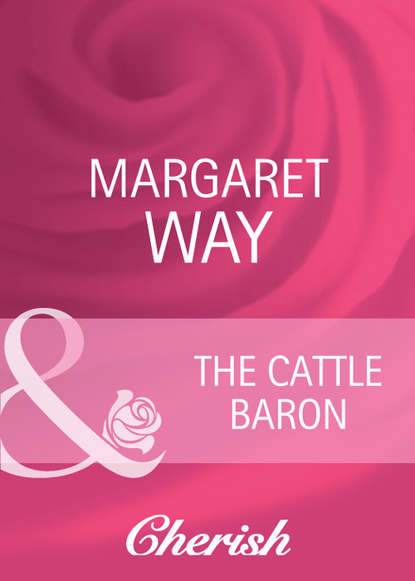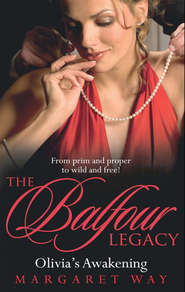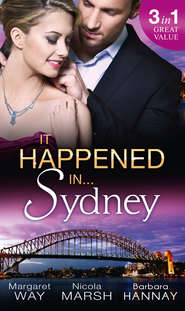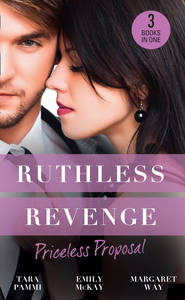По всем вопросам обращайтесь на: info@litportal.ru
(©) 2003-2024.
✖
The Cattle Baron
Автор
Год написания книги
2018
Настройки чтения
Размер шрифта
Высота строк
Поля
The Cattle Baron
Margaret Way
The Place: North Queensland, Australia. A land of fierce contrasts, of astonishing beauty - and fatal dangers. A land of secrets…The Man: Chase Banfield. A true Australian aristocrat - the master of Three Moons, a historic cattle station.The Woman: Rosie Summers. A reporter known for her fearlessness - and her stunning looks.What brings Chase and Rosie together is a search for Egyptian artifacts. There's reputed to be two-thousand-year-old evidence of an ancient Egyptian presence on Banfield land, and despite his reservations, Chase agrees to an expedition. What keeps him and Rosie together, though, is something very different….
“You’re going to say no.”
Rosie felt a surge of disappointment. Not least because it meant she’d be losing all contact with him.
Chase shook his head. “I can’t bury my disquiet,” he said. “I’m of two minds about whether or not to allow an expedition like this on Three Moons. Still, it was great to see Mick show such enthusiasm. He’s always been on about the Egyptian connection. A lot of people up here still are.”
She stared up at him. “And you?” she asked.
He threw her a sidelong smile. “I’ll admit this is all fascinating stuff. I do have an imagination—but I also have a cattle station to run.”
“Yet you’re afraid to let us go off by ourselves?”
He answered with some force. “I’m afraid to let you go off, Miss Summers. I appreciate that you’ve had terrifying times covering your war stories, but you can equally well get lost or killed in the jungle.”
“I’m game,” she said with a shrug. “But let me point out that you, Mr. Banfield, are the ideal man to head this expedition.”
“What would I get out of it?” he demanded.
A nearly audible chord of excitement vibrated in the air between them as attraction assumed real shape and substance.
Rosie had never felt so vulnerable in her life, literally quaking. “You can hardly be suggesting we become lovers.” Even saying it aroused her….
Dear Reader,
For years now, I’ve wanted to write a book about an ancient Egyptian presence in Australia. This is it!
My interest was captured as a young woman when I read in the paper about a find of hand-forged Egyptian bronze, copper and iron tools, pottery and coins dating back more than two thousand years. This discovery took place on an excavation site less than thirty miles from where we lived. The following year, five hundred miles away in tropical North Queensland, an Egyptian calendar stone, gold scarabs and gold coins were found.
There’s a well-known story of a North Queensland cattleman who used to serve his dinner guests off gold plates fashioned from melted down gold coins found on the station!
Objects that appear to be from ancient Egypt have also appeared in Western Australia and New South Wales.
These finds excited me. I had been an avid student of ancient history in high school, perhaps because of a vivid and romantic imagination, so I knew quite a lot about ancient civilizations. Egypt has always had a strange fascination for me, akin to my love of ghost stories and the supernatural. Perhaps you feel the same way.
So was there an ancient Egyptian presence in Australia? My heroine, Rosie Summers, thinks so, although cattle baron Chase Banfield is skeptical. See what you think!
Margaret Way
The Cattle Baron
Margaret Way
The Cattle Baron
CONTENTS
PROLOGUE
CHAPTER ONE
CHAPTER TWO
CHAPTER THREE
CHAPTER FOUR
CHAPTER FIVE
CHAPTER SIX
CHAPTER SEVEN
CHAPTER EIGHT
CHAPTER NINE
CHAPTER TEN
CHAPTER ELEVEN
CHAPTER TWELVE
EPILOGUE
AN INTERVIEW WITH MARGARET WAY
PROLOGUE
3500 B.C.
The Great South Land
BURU BURU CROSSED the beautiful crystal river without incident, though a gigantic crocodile cruised downstream, its massive head turned Buru Buru’s way. The crocodile’s yellow eyes were open, unmoving, narrowed against the molten brilliance of the sun. Another crocodile almost as monstrous had taken up a position on the white sandy bank of the crossing, steadily watching its territory. Buru Buru was not afraid. He chanted a magic song beneath his breath. These were Dreaming Crocodiles, sacred to his people, keepers of the tribe’s secrets, its ancient rituals.
Inside the enormous reptiles lived mythical beings, spirits from the Eternal Dreamtime, which held every black man in its stream. The black man’s culture had existed since time began; now it was pressed to desperation by the arrival of the copper skins, who worshiped strange gods and turned everything to fear and anguish. These frightening newcomers had come from the sea. Not on rafts or in the small long-nosed bark canoes the men of Buru Buru’s tribe used to hunt fish and turtles, but in large painted vessels that moved swiftly like the clouds.
In the early days of the terrible invasion, many of his people had been captured and killed, too bewildered by what was happening to run and hide. The people of Buru Buru’s tribe were gentle, peace-loving, unused to violence. The dreadful debbil-debbils came from a different world. A world where men killed fiercely for no reason Buru Buru could understand. They even killed one another, laying their victims on a great ceremonial stone slab as though proud of the blood that dripped from the sorcerer’s dagger. These tall invaders with their cruel sharp features and beaks of noses, not wide at the base like Buru Buru’s own but thin and straight. The lips were cold slashes over strong white teeth. More frightening, they were strong. Bigger, heavier, than the men of Buru Buru’s clan, their tall lean bodies wrapped from waist to knee in something softer and more supple than the finest woven grasses. The women, unlike his own women, covered their breasts, their heavy long hair swinging to their shoulders, bound around the forehead with shining ornaments unfamiliar to Buru Buru’s eyes. The women of Buru Buru’s tribe wore flowers or the colorful feathers that fell from the wings of legions of birds. Like Buru Buru’s people, the newcomers were constantly in search of food, and they had better weapons for the hunt. They protected their bodies, too, with heavy glinting shields fashioned from something Buru Buru could not divine. But even the best of them lacked his own people’s skills, especially with the spear, which was shorter than the newcomers’. Worse, they had dared to take and keep many of the tribe’s boomerangs, which only the black man had the right to carry. This and other punishable sins, such as the desecration of a sacred site for their place of worship, had called down the wrath of the Great Ancestors, whose power was far beyond that of the debbil-debbil’s gods.
The Great Ancestors governed the land and everything on it: man, animals, vegetation. The Great Ancestors owned the bright yellow gibber stones the newcomers hunted so avidly along the mighty river’s banks, even risking the spirit crocodiles who crushed many for their transgression between powerful jaws. Still, the invaders courted such death. And for what? To make their pretty ornaments? Their little figures? These yellow stones washed down by the yearly floodwaters had been known to Buru Buru’s people since the beginning of time. They saw little value in them, except perhaps for the children, who liked to make them skip across the stream, watching the bright pebbles skim the waters before sinking beneath them. The black people knew the great source of these riverine fragments. The mother lode was buried in sacred rock walls, veins of it like jagged lightning on the dark stone. Much as the newcomers sought this sacred place, they would never find it. Let them continue to wash the stones of river sand in their vessels. They could never obtain the bright ribbons embedded in the sacred rocks.
But the worst offense of all, and for which the invaders had been condemned to die, was the bringing of sickness to Buru Buru’s people. Before the invaders arrived, diseases had been few among the tribes; now there were many, many deaths. The Great Ancestors had shown their wrath in the night skies. This was the time. As an important ritual leader, Buru Buru had sat in council. Punishment by death except in extreme cases, like violations of sacred law, was itself a terrible offense. But because of the great grief and chaos the debbil-debbils had caused, the council had spoken.
He, Buru Buru, who could move like a shadow, had been instructed to scout out the camp, to choose the exact moment. Deliberate killing would come hard to his men. Physical violence was not an accepted code of behavior. But the black man would be merciful. The end would come quickly and without warning. Under the cloak of night, the potent drink the copper skins used in their ceremonies would be laced with the juice of certain magic berries collected by the women of Buru Buru’s tribe. The juice did not kill but induced a strange state where a man could see visions or enter a trance during which he would be rendered incapable of retaliation. Then the fighting men would move into the enemy camp. Great in number, the whole of Buru Buru’s clan had been called in from the mountain rain forests, the coastal streams, the offshore islands, all along the blue sea with its wondrous beauty. Great hunters, all of them, with intimate knowledge of the land and its creatures. His chest heaving, Buru Buru climbed up onto the bank at the very moment the great crocodile on the flood plane drove its massive claws into the sand, propelling itself down a smooth slide into the river, where it sank below the sparkling surface amidst a silver spray of water. Buru Buru understood its significance. The Great Spirit inside the crocodile would join forces with the clans to drive the invader out.
CHAPTER ONE
Margaret Way
The Place: North Queensland, Australia. A land of fierce contrasts, of astonishing beauty - and fatal dangers. A land of secrets…The Man: Chase Banfield. A true Australian aristocrat - the master of Three Moons, a historic cattle station.The Woman: Rosie Summers. A reporter known for her fearlessness - and her stunning looks.What brings Chase and Rosie together is a search for Egyptian artifacts. There's reputed to be two-thousand-year-old evidence of an ancient Egyptian presence on Banfield land, and despite his reservations, Chase agrees to an expedition. What keeps him and Rosie together, though, is something very different….
“You’re going to say no.”
Rosie felt a surge of disappointment. Not least because it meant she’d be losing all contact with him.
Chase shook his head. “I can’t bury my disquiet,” he said. “I’m of two minds about whether or not to allow an expedition like this on Three Moons. Still, it was great to see Mick show such enthusiasm. He’s always been on about the Egyptian connection. A lot of people up here still are.”
She stared up at him. “And you?” she asked.
He threw her a sidelong smile. “I’ll admit this is all fascinating stuff. I do have an imagination—but I also have a cattle station to run.”
“Yet you’re afraid to let us go off by ourselves?”
He answered with some force. “I’m afraid to let you go off, Miss Summers. I appreciate that you’ve had terrifying times covering your war stories, but you can equally well get lost or killed in the jungle.”
“I’m game,” she said with a shrug. “But let me point out that you, Mr. Banfield, are the ideal man to head this expedition.”
“What would I get out of it?” he demanded.
A nearly audible chord of excitement vibrated in the air between them as attraction assumed real shape and substance.
Rosie had never felt so vulnerable in her life, literally quaking. “You can hardly be suggesting we become lovers.” Even saying it aroused her….
Dear Reader,
For years now, I’ve wanted to write a book about an ancient Egyptian presence in Australia. This is it!
My interest was captured as a young woman when I read in the paper about a find of hand-forged Egyptian bronze, copper and iron tools, pottery and coins dating back more than two thousand years. This discovery took place on an excavation site less than thirty miles from where we lived. The following year, five hundred miles away in tropical North Queensland, an Egyptian calendar stone, gold scarabs and gold coins were found.
There’s a well-known story of a North Queensland cattleman who used to serve his dinner guests off gold plates fashioned from melted down gold coins found on the station!
Objects that appear to be from ancient Egypt have also appeared in Western Australia and New South Wales.
These finds excited me. I had been an avid student of ancient history in high school, perhaps because of a vivid and romantic imagination, so I knew quite a lot about ancient civilizations. Egypt has always had a strange fascination for me, akin to my love of ghost stories and the supernatural. Perhaps you feel the same way.
So was there an ancient Egyptian presence in Australia? My heroine, Rosie Summers, thinks so, although cattle baron Chase Banfield is skeptical. See what you think!
Margaret Way
The Cattle Baron
Margaret Way
The Cattle Baron
CONTENTS
PROLOGUE
CHAPTER ONE
CHAPTER TWO
CHAPTER THREE
CHAPTER FOUR
CHAPTER FIVE
CHAPTER SIX
CHAPTER SEVEN
CHAPTER EIGHT
CHAPTER NINE
CHAPTER TEN
CHAPTER ELEVEN
CHAPTER TWELVE
EPILOGUE
AN INTERVIEW WITH MARGARET WAY
PROLOGUE
3500 B.C.
The Great South Land
BURU BURU CROSSED the beautiful crystal river without incident, though a gigantic crocodile cruised downstream, its massive head turned Buru Buru’s way. The crocodile’s yellow eyes were open, unmoving, narrowed against the molten brilliance of the sun. Another crocodile almost as monstrous had taken up a position on the white sandy bank of the crossing, steadily watching its territory. Buru Buru was not afraid. He chanted a magic song beneath his breath. These were Dreaming Crocodiles, sacred to his people, keepers of the tribe’s secrets, its ancient rituals.
Inside the enormous reptiles lived mythical beings, spirits from the Eternal Dreamtime, which held every black man in its stream. The black man’s culture had existed since time began; now it was pressed to desperation by the arrival of the copper skins, who worshiped strange gods and turned everything to fear and anguish. These frightening newcomers had come from the sea. Not on rafts or in the small long-nosed bark canoes the men of Buru Buru’s tribe used to hunt fish and turtles, but in large painted vessels that moved swiftly like the clouds.
In the early days of the terrible invasion, many of his people had been captured and killed, too bewildered by what was happening to run and hide. The people of Buru Buru’s tribe were gentle, peace-loving, unused to violence. The dreadful debbil-debbils came from a different world. A world where men killed fiercely for no reason Buru Buru could understand. They even killed one another, laying their victims on a great ceremonial stone slab as though proud of the blood that dripped from the sorcerer’s dagger. These tall invaders with their cruel sharp features and beaks of noses, not wide at the base like Buru Buru’s own but thin and straight. The lips were cold slashes over strong white teeth. More frightening, they were strong. Bigger, heavier, than the men of Buru Buru’s clan, their tall lean bodies wrapped from waist to knee in something softer and more supple than the finest woven grasses. The women, unlike his own women, covered their breasts, their heavy long hair swinging to their shoulders, bound around the forehead with shining ornaments unfamiliar to Buru Buru’s eyes. The women of Buru Buru’s tribe wore flowers or the colorful feathers that fell from the wings of legions of birds. Like Buru Buru’s people, the newcomers were constantly in search of food, and they had better weapons for the hunt. They protected their bodies, too, with heavy glinting shields fashioned from something Buru Buru could not divine. But even the best of them lacked his own people’s skills, especially with the spear, which was shorter than the newcomers’. Worse, they had dared to take and keep many of the tribe’s boomerangs, which only the black man had the right to carry. This and other punishable sins, such as the desecration of a sacred site for their place of worship, had called down the wrath of the Great Ancestors, whose power was far beyond that of the debbil-debbil’s gods.
The Great Ancestors governed the land and everything on it: man, animals, vegetation. The Great Ancestors owned the bright yellow gibber stones the newcomers hunted so avidly along the mighty river’s banks, even risking the spirit crocodiles who crushed many for their transgression between powerful jaws. Still, the invaders courted such death. And for what? To make their pretty ornaments? Their little figures? These yellow stones washed down by the yearly floodwaters had been known to Buru Buru’s people since the beginning of time. They saw little value in them, except perhaps for the children, who liked to make them skip across the stream, watching the bright pebbles skim the waters before sinking beneath them. The black people knew the great source of these riverine fragments. The mother lode was buried in sacred rock walls, veins of it like jagged lightning on the dark stone. Much as the newcomers sought this sacred place, they would never find it. Let them continue to wash the stones of river sand in their vessels. They could never obtain the bright ribbons embedded in the sacred rocks.
But the worst offense of all, and for which the invaders had been condemned to die, was the bringing of sickness to Buru Buru’s people. Before the invaders arrived, diseases had been few among the tribes; now there were many, many deaths. The Great Ancestors had shown their wrath in the night skies. This was the time. As an important ritual leader, Buru Buru had sat in council. Punishment by death except in extreme cases, like violations of sacred law, was itself a terrible offense. But because of the great grief and chaos the debbil-debbils had caused, the council had spoken.
He, Buru Buru, who could move like a shadow, had been instructed to scout out the camp, to choose the exact moment. Deliberate killing would come hard to his men. Physical violence was not an accepted code of behavior. But the black man would be merciful. The end would come quickly and without warning. Under the cloak of night, the potent drink the copper skins used in their ceremonies would be laced with the juice of certain magic berries collected by the women of Buru Buru’s tribe. The juice did not kill but induced a strange state where a man could see visions or enter a trance during which he would be rendered incapable of retaliation. Then the fighting men would move into the enemy camp. Great in number, the whole of Buru Buru’s clan had been called in from the mountain rain forests, the coastal streams, the offshore islands, all along the blue sea with its wondrous beauty. Great hunters, all of them, with intimate knowledge of the land and its creatures. His chest heaving, Buru Buru climbed up onto the bank at the very moment the great crocodile on the flood plane drove its massive claws into the sand, propelling itself down a smooth slide into the river, where it sank below the sparkling surface amidst a silver spray of water. Buru Buru understood its significance. The Great Spirit inside the crocodile would join forces with the clans to drive the invader out.
CHAPTER ONE











